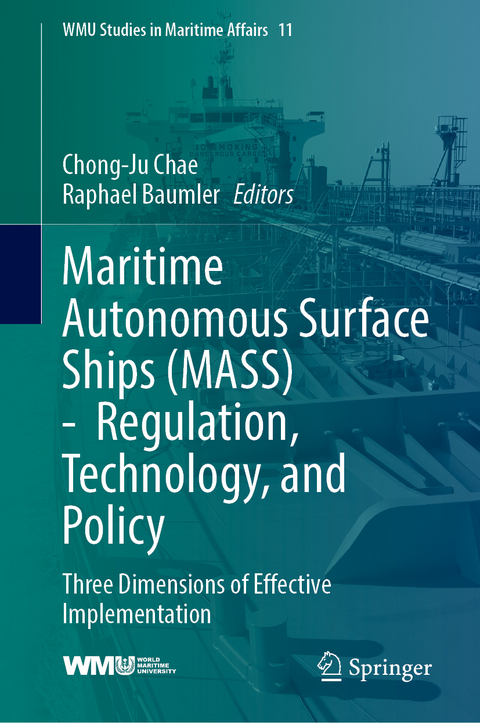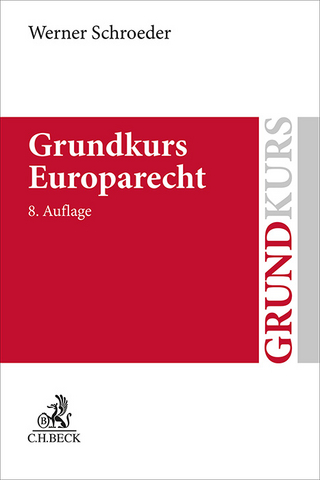
Maritime Autonomous Surface Ships (MASS) - Regulation, Technology, and Policy
Springer International Publishing (Verlag)
978-3-031-69436-3 (ISBN)
This book covers MASS regulation, technology, and policy. MASS development began with the realization of the 4th industrial revolution technologies such as big data, AI, IoT, and communication, which were also linked to technological development in the maritime field. However, it is still unclear how MASS will operate. This book is divided into three parts: MASS regulation, technology, and policy, and explains each part in detail.
Part I "MASS regulation and safety" deals with IMO works for MASS, including IMO MASS RSE results which has been finished in 2021. In addition, the United Nations Convention on the Law of the Sea (UNCLOS), one of the most important international conventions to be considered for MASS operation, will be dealt with and various safety considerations will be explained in detail. Through this, this book explains in detail the regulatory considerations and safety considerations for MASS. In particular, the gaps and themes identified in IMO MASS RSE and the priority discussion needs are explained, and based on this, the development of a goal-based non-mandatory MASS code currently in progress is discussed. UNCLOS is a convention like the blueprint of the IMO Conventions, and it is very important to understand and meet the requirements of UNCLOS for the operation of MASS. Therefore, this book provides a detailed explanation of the application of UNCLOS. In particular, UNCLOS Article 94 would be a very important consideration. Also, this book covers COLREGs and technologies for MASS operations.
Dr. Chong-Ju Chae has had experience on board on VLCC for 7 years and was granted a 1 Class deck officer license (Master mariner). After which he joined the academic area and has been researching maritime safety and environment protection technologies. Also, he has attended IMO meetings, in particular IMO MSC and TCC committee, and HTW sub-committee on behalf of the government since 2009. He finished his first master's degree at Korea Maritime and Ocean University and majored in Maritime Safety and Environment Engineering, and second master's degree was Maritime Safety and Environmental Administration(MSEA) in World Maritime University(WMU). And for PhD, he majored in Maritime Technology and Safety Engineering at Korea Maritime and Ocean University. Based on his practical and academic experience, he published various articles and books as author/co-authors such as Oil Tanker, Dynamic Positioning System Operation, IMO Guide Book etc. He is mainly focusing on safety operations of special purpose vessels(i.e. Oil Tanker, DPS, Smart ship, MASS etc.) and environment protection technologies. He is also interested in research on safe operation of ships taking into account human factors and accident analysis, and research on simulator training such as FMSS, VR, and Maritime Autonomous Surface Ship (MASS) remote operation simulator.
Raphael Baumler is a head of the Master of Science Maritime Safety and Environmental Administration at the World Maritime University (WMU). He is lead Consultant and project manager for the International Maritime Organization (IMO) on Ballast Water Management Convention (BWMC), Energy Efficiency as per MARPOL Annex VI, Ship recycling, and the Technical Cooperation Division of the IMO. He is also in charge of International Labour Organization (ILO) trainer on Maritime Labour Convention 2006 (MLC2006). He holds a Ph.D. in Risk Management and focuses his academic work on the impact of the vessel's socioeconomical environment on safety and environment. Primarily educated as a dual officer, he has worked on various types of vessels. Dr. Baumler spent 20 years in a seafaring career. He ended this occupation after six years as Master on a large container ship. His sea life drove him to work as Staff Captain on a cruise ship, and he completed various assignments as dual Junior Officer on board container ship, ferry, VLCC and supply vessel.
Introduction.- PART I: MASS REGULATION AND SAFET.- MASS and IMO Works.- Unmanned Ships and Flag State Jurisdiction.- MASS, COLREGs, and Technologies.- MASS and Safety.- Risk Assessment for MASS.- PART II: MASS AND TECHNOLOGY.- Autonomous Navigation System.- MASS and Artificial Intelligence.- MASS Cybersecurity.- Thinking MASS in System.- PART III: MASS AND POLICY.- MASS and Liability for Damages.- MASS and Decarbonization Policy: Exploring the Nexus Between MASS and Decarbonization Efforts.- MASS and Humans Interlinked: Errors, Skills, Training, And Job Market.- Revisiting New Maritime Education and Training in the Era of MASS.- Bridge simulator as a training platform for future remotely controlled MASS Navigations.
| Erscheinungsdatum | 03.12.2024 |
|---|---|
| Reihe/Serie | WMU Studies in Maritime Affairs |
| Zusatzinfo | XIII, 316 p. 65 illus., 52 illus. in color. |
| Verlagsort | Cham |
| Sprache | englisch |
| Maße | 155 x 235 mm |
| Themenwelt | Recht / Steuern ► EU / Internationales Recht |
| Schlagworte | Liability and commercial aspects of MASS • Maritime Autonomous Surface Ship (MASS) • Mass • MASS and COLREGs • MASS and decarbonization • MASS and Maritime education and training • MASS and regulation • MASS and UNCLOS • MASS navigation system • MASS remote control • Safety of MASS |
| ISBN-10 | 3-031-69436-8 / 3031694368 |
| ISBN-13 | 978-3-031-69436-3 / 9783031694363 |
| Zustand | Neuware |
| Informationen gemäß Produktsicherheitsverordnung (GPSR) | |
| Haben Sie eine Frage zum Produkt? |
aus dem Bereich


